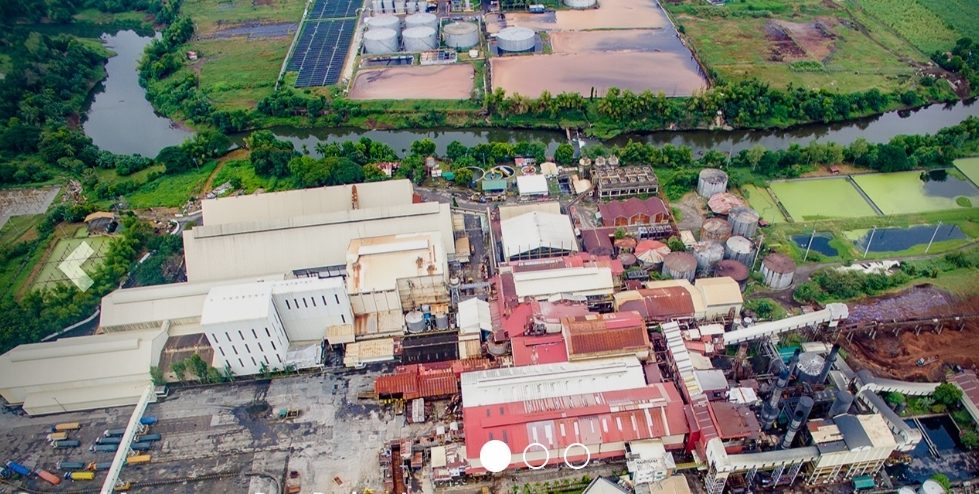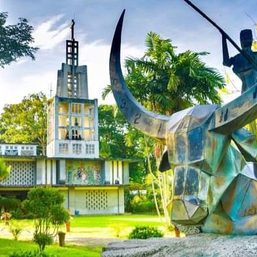SUMMARY
This is AI generated summarization, which may have errors. For context, always refer to the full article.

MANILA, Philippines – Even Blue Eagle Manny V. Pangilinan’s (MVP) business acumen couldn’t save this 97-year-old Philippine company.
Sugar refining firm Central Azucarera Don Pedro Incorporated (CADPI), established in 1927, closed down on Wednesday, February 28, citing “serious business losses.”
CADPI, a subsidiary of publicly listed Roxas Holdings Incorporated (RHI) where Pangilinan sits as vice-chairman, informed the Philippine Stock Exchange on Thursday, February 29, that it was “forced to terminate” all its employees due to closure of operations.
First Pacific Company Limited of Hong Kong, founded by Pangilinan, took a 34% stake in RHI in 2013 and raised it to majority stake two years later. CADPI was established by the forefathers of its current chairman, Pedro E. Roxas, who served for a long time as its president and CEO.

“In compliance with Article 298 of the Labor Code, CADPI has given notice both to the Department of Labor and Employment (DOLE) and the affected employees at least thirty (30) days before the effective date of termination. The effectivity date of the termination of all affected employees is on 29 March 2024,” RHI said.
RHI did not say how many CADPI workers would lose their jobs, but as of end of 2022, CADPI had 445 employees. CADPI workers were sent notices of separation on February 28.
RHI said on Friday, March 1, it had no choice but to close down CADPI since it was draining the parent firm’s financial resources. RHI had a net loss of P797 million in September 2022 and a loss of P938.9 million in September 2021.
“CADPI’s closure of its operations and separation of its employees will essentially mitigate incurrence of manpower costs and other fixed costs,” RHI said.
“CADPI’s closure will prevent further dissipation of resources as opportunities to resume normal operation of the sugar refinery business of CADPI has been affected and/or limited by the increased importation of refined sugar by the national government in the past years,” the company said.
CADPI, located in Nasugbu, Batangas, produced and sold raw and refined sugar, molasses, and related products to traders and industrial customers. Among its customers were multinational food and beverage companies like Nestlé and Coca-Cola Philippines, and pharmaceutical firms such as United Laboratories Incorporated or Unilab.
At one point, CADPI was the Philippines’ second largest raw sugar manufacturer and its biggest producer of refined sugar, said a 2002 paper on labor issues in the Central Azucarera Don Pedro.
It planted and cultivated sugarcane and other farm products, and managed and operated agricultural land. It also owned parcels of land in La Carlota City and in the towns of Pontevedra and Hinigaran in Negros Occidental. Its assets were valued at P2.7 billion in September 2022.
From exporter to importer
CADPI’s closure is indicative of the sad state of the Philippines’ sugar industry.
The Philippines used to be one of the world’s major exporters of sugar, and sugar was among the country’s leading export products. When the Philippines was still an American colony, US companies put up sugar mills that produced sugar for export. The US and the Philippines had free trade relations, and the latter supplied a large part of America’s sugar requirements, but this special relations ended in 1974.
In 1960, the Philippines’ sugar exports still accounted for 11% of world trade, but this fell to 1% in 1990, according to a study by the government think tank Philippine Institute for Development Studies.
For many years now, Philippine sugar production has not been able to keep up with population growth, prompting the government to regularly import sugar and keep prices stable. The breakup of large sugar farms due to the land reform program further hurt the Philippine sugar industry. Sugar farming needs economies of scale to produce efficiently, according to agricultural experts, citing Thailand’s success.
The Philippines has also not been able to produce sugar competitively in the world market.
According to former economic planning secretary Cielito Habito, Philippine raw sugar prices were 1.3 to 2.4 times higher than both world prices and Thailand’s price from 2011 to 2019. Yields of Philippine sugar farms were 60 to 65 tons per hectare compared to an average of 70 to 75 tons for Thailand, India, and Brazil, he said.
“Thailand has managed to keep up with world productivity levels, whereas the Philippines has consistently suffered much lower productivity, hence much higher costs,” Habito wrote in a column on August 23, 2022.
CADPI modernized its facilities through the years as the Philippines opened up its economy as mandated by the General Agreements on Tarrifs and Trade-World Trade Organization and the ASEAN Free Trade agreements.
‘Heavy blows’
CADPI was already facing difficulties in the past few years.
In December 2021, Typhoon Odette destroyed a big part of the country’s sugarcane farms in southern Luzon and Western Visayas, where RHI operated. CADPI’s milling operations were hit by a big drop in supply of sugarcanes.
In December 2022, RHI closed its sugar milling operations. Three months later, in March 2023, it announced that it had sold its “unutilized and idle” sugar milling equipment and machineries to the Gokongwei Group’s food and beverage company Universal Robina Corporation. The assets were valued at P897 million.
RHI had hoped “more potential for sustainable operations” if CADPI focused purely on sugar refinery in Batangas, along with RHI’s ethanol plant in Negros Occidental.
In a statement in February 2023, the farmers group Sugarfolks’ Unity for Genuine Agriculture Reform-Batangas warned that the closure of CADPI’s milling operations would hurt 4,584 sugarcane planters in Batangas and mean less work for more than 10,000 sugarcane field workers. It urged the government to take over CADPI, provide subsidies for sugarcane planters, stop sugar importation, and extend aid to sugarcane farmers affected by CADPI’s closure.
CADPI sourced its sugar cane from planters and traders in Batangas.
In May 2023, RHI chair Roxas said CADPI’s sugar refinery operations were dealt “heavy blows” by the government’s move in February to import 440,000 metric tons (MT) of refined sugar on top of the 150,000 MT imported in crop year 2022-2023.
“It has been difficult for local sugar refineries to compete given the high prices of raw sugar feedstock and of outside fuel costs, which have increased significantly in recent years,” RHI said in 2023. “These costs eroded the white premium margin to entice local refineries to process and refine raw sugar.”
On Friday, RHI said CADPI was informed by the Sugar Regulatory Authority (SRA) that the current inventory of refined sugar in the market “must first be depleted before CADPI can offer refined sugar to the public.”
RHI said this was projected to take around 8 to 12 months, adding that this was “too long a period of non-generation of income by CADPI from its sugar refinery operations.”
It said that RHI’s other productive activities, such as its ethanol plant San Carlos Bioenergy Incorporated, could not support the parent’s recurrent costs.
“Thus, maintaining CADPI’s sugar refinery business proves to be extremely difficult and no longer viable,” RHI said.
RHI said it would be disposing of idle assets to prospective buyers to pay its obligations.
On Thursday, SRA chief Pablo Luis Azcona said CADPI’s closure meant one less Philippine company refining premium sugar. With the loss of the refining capacity in Luzon, he said premium refined sugar would come from four companies in Negros island and one in Bukidnon. – Rappler.com
Add a comment
How does this make you feel?
![[Vantage Point] When sugar turns sour: End users agonize from high prices](https://www.rappler.com/tachyon/2024/02/tl-sugar-turns-sour-February-6-2024.jpg?fit=449%2C449)












![[Vantage Point] When sugar turns sour: End users agonize from high prices](https://www.rappler.com/tachyon/2024/02/tl-sugar-turns-sour-February-6-2024.jpg?resize=257%2C257&crop_strategy=attention)
There are no comments yet. Add your comment to start the conversation.